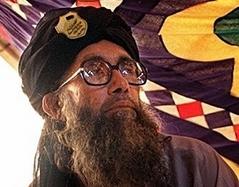
Militant or Peace Broker? A Profile of the Swat Valley’s Maulana Sufi Muhammad
Publication: Terrorism Monitor Volume: 7 Issue: 7
By:

The peace deal between the Islamabad government and local Taliban militants in Pakistan’s northwestern Swat valley has, once again, drawn international attention towards Maulana Sufi Muhammad, a pro-Taliban religious leader who has long fought for the implementation of shari’a (Islamic law) in the region and who has also fought alongside the Taliban against U.S. troops in the wake of the September 11 attacks.
A Leader in Regional Radicalization
Maulana Sufi Muhammad actively participated in the Afghan jihad against the Soviet Union. After returning from Afghanistan in the late 1980s, he established his own religious organization in 1992, called Tehrik-e-Nifaz-e-Shariat-e-Mohammadi (TNSM), an extremist group practicing a strict version of Islam (The News, March 11, 2002). Maulana Sufi first shot to prominence when he issued a fatwa ordering a jihad against U.S. forces after the post-9/11 invasion of Afghanistan. He openly recruited people from the Malakand region and nearby districts before illegally crossing the border into Afghanistan with around 10,000 volunteers to fight U.S. troops. The fighters, mostly young and inexperienced, were crushed by U.S. and Northern Alliance forces and many failed to return home after being killed or captured. Maulana Sufi was arrested by the government of Pakistan on his return in early 2002 for defying government orders. He was convicted on April 24, 2002 and sentenced to seven years of imprisonment for inciting people to illegally cross into Afghanistan. Pakistani President Pervez Musharraf also issued a ban on the TNSM and several other militant organizations (see Terrorism Monitor, November 30, 2006).
During his long stay in prison, Maulana Sufi never appealed for his release in any court of law. He argued that these courts were un-Islamic and that he would never appear in such secular courts. After spending five years in prison for his role in the disastrous cross-border excursion, Maulana Sufi was released in April 2008 under a peace deal designed to restore normalcy to the Swat valley —a picturesque region in the North-West Frontier Province (NWFP) taken over by local militants following a nearly two-year campaign. This move by the Awami National Party (ANP) – the secular and nationalist party that forms the government of the troubled Frontier Province – aimed to bring Sufi back to help broker a deal between the government and Taliban militants in the Swat region under the leadership of his son-in-law, Maulana Fazlullah (BBC, January 12, 2009). The deal followed assurances from the cleric that he and his supporters would remain peaceful (Daily Times [Lahore], April 23, 2008).
Maulana Sufi has now returned to the headlines because of his role as mediator and peace-broker between the government and the Taliban militants in the Swat valley. This once strong opponent of the government is now being used by the government (especially the secular alliance of the ANP and the Pakistan People’s Party (PPP) in their negotiations with the Taliban militia in the Swat valley and Bajaur tribal agency, the latest hot spots where the Pakistan army has been battling hard against Taliban insurgents. Maulana Sufi has successfully mediated a deal between the government and Maulana Fazlullah, the top Taliban commander in the Swat valley. The deal followed 16 months of fighting which left more than 1,200 civilians dead and hundreds of thousands displaced from their homes and villages (Dawn [Islamabad] January 30, 2009).
A Long History of Religious Extremism
The 78-year-old Maulana Sufi Muhammad was born in the village of Maidan, in the Lal Qila region of the NWFP’s Dir district. He is Tajik by origin, and has 13 sons and six daughters. Maulana Sufi completed his religious education in 1959 at the religious seminary of Darul Uloom Haqqania, located in Saidu Sharif, headquarters of the Swat valley. Soon after receiving his degree, he returned to his native village, where he started preaching an extremist version of Islam in mosques and madrassas (Daily Mashriq [Peshawar], February 21). Although he studied in a Deobandi madrassa, his long association with Arabs and Afghans has brought him closer to the strict Wahhabi school of thought.
Maulana Sufi was not a traditional religious scholar occupied with teaching Islamic duties to a local community. Instead, he was more inclined towards the establishment of a shari’a-based society where everything from daily life to governance and social services could be administered through the implementation of a strict version of Islam. He wanted to play a leading role in this regard, which led him to join Jamaat-e-Islami (JI), a hard-line Islamist party with great influence in the districts of Malakand, Swat and Dir. Maulana Sufi was part of the JI for years and finally quit in 1981 over sharp differences with JI’s central leadership on the issue of electoral politics. Sufi believes that there is no place for democracy in Islam and that any party participating in the election process should be regarded as un-Islamic. He is not shy of revealing his hate for democracy; soon after signing the peace deal with the government last month, he once again declared that democracy is a system of kufr (unbelief); “The concept of democracy is against the teachings of the holy Qur’an and Sunnah” (The News [Islamabad], February 18; Daily Times, March 1).
It was in Peshawar (the NWFP capital) that Maulana Sufi publicly declared in 1998 that anyone in the country that speaks against shari’a is destined to be killed. According to some local journalists who have interacted with him, a change of stance has been noticed in Maulan Sufi’s approach when it comes to the implementation of shari’a. They note that, while he still wants an Islamic system, he now shuns violent methods and argues for peaceful ways and means to introduce shari’a (Daily Mashriq, April 24, 2008).
TNSM – The Rise of the Black-Turbaned Brigade
As the TNSM founder, Maulana Sufi chose the black turban and black flag as the emblems of this hard-line group, leading to their nickname, “The Black-Turbaned Brigade” (Daily Mashriq, February 21). TNSM’s goal has been clear since its creation in 1992- the implementation of a strict version of shari’a in the whole Malakand region, which includes the districts of Swat, Buner, and Upper and Lower Dir. As the group grew in numbers and influence, it warned the government that if it did not implement shari’a in the region, the group would block all the leading roads of Malakand region as a mark of protest. They carried out their threat in 1994, as Maulana Sufi led an armed revolt of thousands of people which blocked all the main roads linking Malakand region with rest of the country, bringing life in the area to a standstill. TNSM militants occupied several government buildings, including a local airport. They also kidnapped a number of government officials. The secular government of then-Prime Minister Benazir Bhutto accepted their demands and promulgated the Shari’a Ordinance to set up Qazi courts for the delivery of speedy justice in the region (Daily Times, March 18; Monthly Newsline [Karachi] February 2009). Interestingly, it was exactly during this time that the Taliban movement in Afghanistan was also extending its writ by leaps and bounds. Over the years, Maulana Sufi has established strong ties with the Taliban regime in Afghanistan.
Conclusion
There are many who doubt Maulana Sufi’s new role as a peace-broker because of his long history of extremism and jihad activities. The Pakistani government is apparently counting on their long-time antagonist to bring peace and normality to the war-ravaged Swat region, a course which could prove counter-productive. Despite the apparent success of Maulana Sufi Muhammad in brokering the Swat peace deal between the government and the Maulana Fazlullah-led militants, there are serious doubts and apprehensions surrounding the agreement. All such peace deals in the past failed bitterly in bringing peace and stability. Instead, militants have gained more power and strength as a result of such concessions. This could happen in Swat too. Already, there are reports that militants have started shifting their activities from Swat to the adjoining Upper and Lower Dir districts. Fazlullah’s Taliban militants haven’t fully stopped their activities in the restive Swat district either, despite declaring a ceasefire (The News, March 20). Interestingly, the guarantor of the Swat peace deal, Maulana Sufi Muhammad and his TNSM organization, fail to criticize the militants for violating the ceasefire by kidnapping government officials, attacking security forces, carrying out targeted killings, and undertaking armed patrols in parts of the valley. Instead, Maulana Sufi and his TNSM have been blaming the government for continuing tensions, clearly indicating his loyalties and his future course of action in the likely event the peace deal fails.





